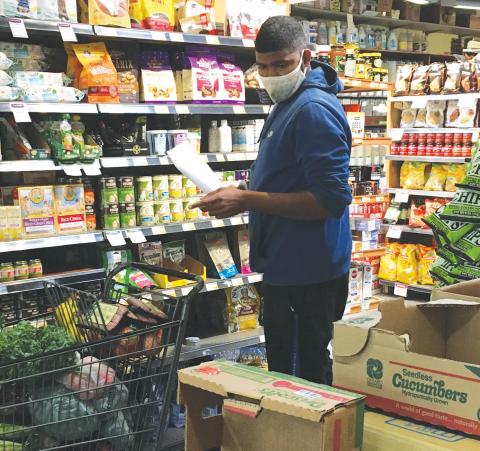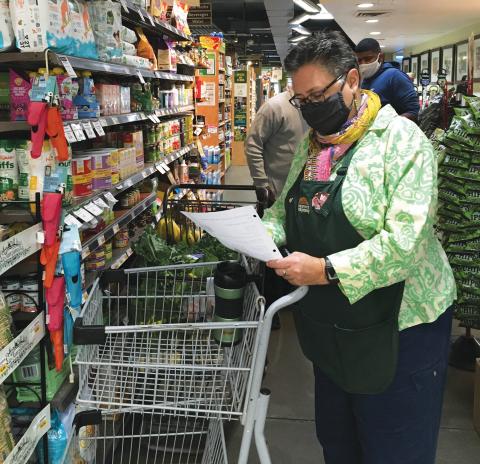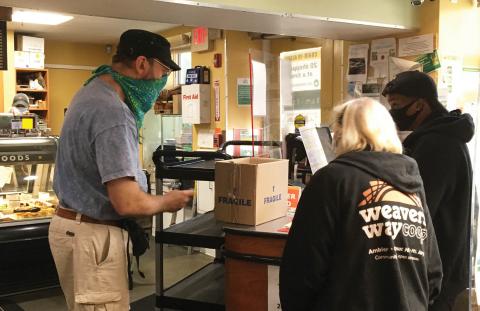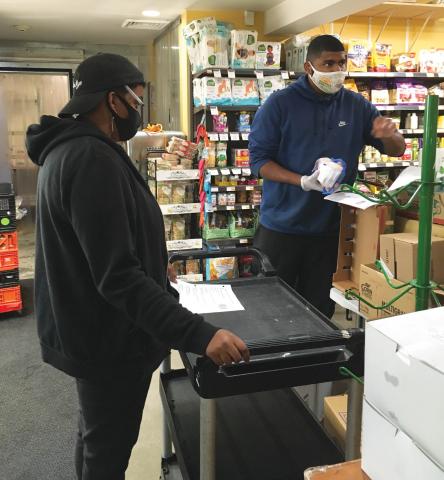Part 2 of 3: Higher Costs, More Staff and More Cleaning
This is the second in a three-part series on how the outbreak of COVID-19 affected operations at Weavers Way.
The increase in new memberships at Weavers Way has leveled off, but the cost of operations in the time of a pandemic are steep. In the first few weeks, members did not have to pay a fee for home delivery or curbside pickup. Demand for these services increased dramatically, as people who didn’t feel comfortable in the stores chose alternative ways to get their groceries.
So many people submitted food orders that the Co-op had to impose fees — $7 for home delivery and $5 for curbside pickup. “Even then,” said General Manager Jon Roesser, “the fees don’t cover the operational costs of the program.”
Staffing has taken the biggest hit since COVID took hold. In March and April, seven employees quit, 28 took (leaves of absence?) and two employees were furloughed, according to Human Resources Manager Janet Potts. Some quit when the pandemic forced businesses to close and quarantines were imposed, because they had children to care for; others left because they were concerned about their personal safety and health. Potts said of those who left voluntarily, 16 did not return.
As a result of the staffing changes and increased traffic in the store, the Co-op had to move quickly and hire 39 additional personnel, Potts added. Some of those, about four per store, were hired just to process home delivery and curbside orders. In addition, all staff interacting with the public were given an additional $2 an hour at a cost of $12,000 per week. To date, hazard pay has totaled close to $300,000.
Doing the Social Distancing Dance
Increased cleaning and sanitizing has also required the purchase and use of more products and more staff hours.
“We always deep-cleaned the register every hour and we’ve always done our best to keep things clean,” said Ambler Front End Manager Jax Arnold, whose responsibilities include overseeing the registers, shopping carts and baskets. “But we’re definitely being more cautious about wiping down certain areas that we didn’t think about before. Cleaning the carts and the baskets — that was new.”
The Ambler store is the largest of the Co-op’s three main stores, but even so, the area near the registers can get crowded during busy periods. And while signs indicate where to stand for social distancing, Arnold admits the register lines can be confusing.
“We have five registers, but with trying to keep social distancing between the cashiers, we have three open at a time,” she said. “If it’s busy, we will open another one just to get the line going. Also, the flow of the line can be challenging. There are guides on the floor. People don’t always follow them, and so it can look like a cluster in the front and I’m sure people feel like someone’s cutting in front of them.”
The Shift in Co-op Shopper Culture
Before the pandemic, shoppers could often be found clustered just about anywhere and everywhere in the Co-op’s flagship Mt. Airy store. The changes in shopper habits have likely been felt more there than in the other locations, according to Store Manager Rick Spalek.
“The biggest changes for us is that we are very busy in the morning getting deliveries together, but much slower at dinnertime and Sundays, which were our busiest times pre-COVID,” he said. “It’s really odd for us, especially on Sundays, when we could have done $50,000 in sales, and now we are doing little more than half of that.”
The pressures and challenges faced every day by the Co-op’s store managers and staffers include keeping stores clean for shoppers, making sure everyone is wearing a mask, and monitoring any staff who don’t feel well or call out sick.
“We are constantly on top of all sick-outs, making sure symptoms are not COVID-related, and if so, taking action even if it seems unlikely,” Spalek said. “That sets off a chain reaction of other people with close contact. We have had two positives in this store, which is remarkable considering the space and number of staff and shoppers.”
Two Ambler staff members tested positive for COVID in the spring; none have to date in Chestnut Hill. Staff at all the Co-op’s stores remain on alert to spot anyone, staff or shopper, displaying symptoms of COVID. Some days are more of a challenge, and sometimes morale can be tough.
“Morale is down just in general around the world,” said Valerie Baker, assistant store manager in Chestnut Hill. “Taking that into consideration, I believe the morale in the Chestnut Hill store is excellent. There is singing in the aisles in the morning, and a general sense of comradery. Our staff has really stepped up and put their focus into getting products back in the store that our shoppers need, making sure those of our members who are ill or high risk are getting what they need to sustain themselves.”
The Co-op delivers the support and sustenance that the community needs, but it is coming at a cost to the Co-op’s other two principals.
“We operate a triple bottom-line business — people, planet, profit,” Roesser said. “And in theory that means all of our business decisions make good sense from the financial bottom line, the community bottom line and the environmental bottom line. Well, the pandemic moves the community bottom line up to a higher level, and the other two suffer as a result.”
NEXT MONTH: How COVID has changed what we can buy, and where we shop.
Photos by Karen Plourde







